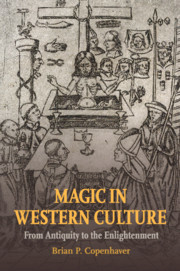Magic in Western Culture From Antiquity to the Enlightenment
Auteur : Copenhaver Brian P.

Date de parution : 10-2018
Ouvrage de 614 p.
15.2x22.8 cm
Disponible chez l'éditeur (délai d'approvisionnement : 14 jours).
Prix indicatif 39,35 €
Ajouter au panierDate de parution : 09-2015
Ouvrage de 612 p.
16.1x23.6 cm
Disponible chez l'éditeur (délai d'approvisionnement : 14 jours).
Prix indicatif 130,19 €
Ajouter au panier